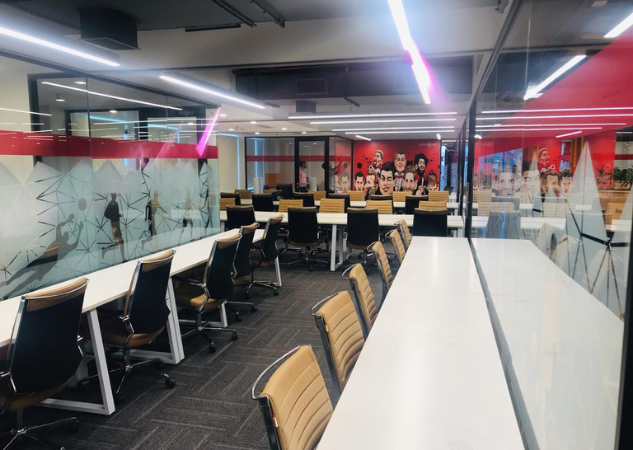Great leaders don’t just fix problems—they understand which ones truly matter and use challenges as opportunities to grow. Effective leadership is about balancing smart decision-making with continuous learning from each situation.
Are you looking for Coworking space in Gurgaon, Noida or Delhi? We are just a call away. Call Now:
10 Ways Great Leaders Decide What to Solve and What to Learn From Problems
- Understanding the Core of Effective Leadership
- Traits of an Effective Leader in Problem-Solving
- Decision Making in Leadership: Choosing What Matters Most
- Using Effective Leadership Skills to Define Priorities
- Turning Problems into Opportunities for Growth
- Building Strong Leadership Qualities Through Reflection
- Balancing Speed and Accuracy in Decisions
- Encouraging Team Involvement in Problem-Solving
- Learning from Mistakes Without Losing Confidence
- Staying Future-Focused While Solving Current Problems
1. Understanding the Core of Effective Leadership
Effective leadership means guiding people and organizations toward success while making wise choices. A great leader doesn’t try to solve every issue—they identify which ones have the highest impact. This skill requires awareness, empathy, and the ability to look at situations from multiple perspectives. By focusing on root causes rather than symptoms, leaders ensure lasting solutions. They also view mistakes not as failures but as lessons that strengthen their leadership problem solving abilities. This approach builds trust, boosts team morale, and helps leaders handle future challenges with confidence.

2. Traits of an Effective Leader in Problem-Solving
One of the key traits of an effective leader is the ability to stay calm under pressure. Strong leadership qualities include clear communication, patience, and resilience. Leaders who excel in problem-solving don’t jump to conclusions—they gather facts, listen to different viewpoints, and make informed decisions. They also remain flexible, knowing that new information can change the best course of action. These traits allow them to tackle complex challenges effectively while keeping their team motivated. By demonstrating fairness and consistency, leaders earn respect and encourage open dialogue.
3. Decision Making in Leadership: Choosing What Matters Most
Decision making in leadership is about selecting the right battles to fight. Great leaders know that not every problem deserves immediate attention. They prioritize issues that align with long-term goals, customer needs, or team well-being. By focusing resources on high-impact problems, leaders avoid wasting time on minor distractions. They use data, team input, and past experiences to guide their choices. This ability to filter and focus ensures that leadership decision making skills stay sharp, enabling them to act with clarity and confidence even in high-pressure situations.
Also Read: How Successful Leaders Get More Done in Less Time?
4. Using Effective Leadership Skills to Define Priorities
Effective leadership skills include knowing how to set clear priorities when faced with multiple challenges. Leaders often ask themselves: Which problem will create the most positive change if solved? They rely on analytical thinking, delegation, and clear communication to manage priorities effectively. This ensures that energy is spent on tasks that truly drive growth. Strong leaders also revisit priorities regularly, as changing circumstances may require adjustments. By mastering this skill, leaders avoid burnout, maintain team focus, and achieve results that align with their organization’s mission.
5. Turning Problems into Opportunities for Growth
Leadership problem solving isn’t just about fixing what’s broken—it’s about finding opportunities hidden within challenges. Great leaders encourage their teams to explore creative solutions, often discovering new ways to improve products, services, or processes. This mindset not only resolves the issue at hand but also strengthens innovation within the team. By framing problems as learning experiences, leaders inspire employees to embrace change rather than fear it. This approach transforms obstacles into stepping stones for future success, building a culture of resilience and adaptability.
6. Building Strong Leadership Qualities Through Reflection
Strong leadership qualities are developed over time, and reflection plays a major role. After solving a problem, great leaders take the time to review their decisions, actions, and outcomes. They ask themselves what went well, what could have been done differently, and what lessons can be applied next time. This habit of self-reflection sharpens leadership decision making skills and builds humility. It also encourages continuous improvement, helping leaders become more adaptable and confident in handling future challenges.
7. Balancing Speed and Accuracy in Decisions
In leadership, acting too slowly can let problems grow, while rushing can lead to poor choices. Effective leaders know how to balance speed and accuracy in decision making. They quickly gather essential information, consult the right people, and assess risks before taking action. This approach prevents wasted time while maintaining quality decisions. It also shows the team that the leader is both decisive and thoughtful. Over time, this balance becomes a hallmark of effective leadership, especially in fast-moving business environments.
8. Encouraging Team Involvement in Problem-Solving
Great leaders understand that leadership problem solving is more effective when the team is involved. They create an open environment where team members feel comfortable sharing ideas, concerns, and possible solutions. This not only leads to more innovative outcomes but also builds a sense of ownership among employees. Leaders who value team input strengthen trust and collaboration, which are essential traits of an effective leader. By leveraging diverse perspectives, leaders make better decisions and ensure that solutions are practical and widely supported.
💡 Are you looking for Coworking space in Gurgaon, Noida or Delhi? We are just a call away. Call Now:
9. Learning from Mistakes Without Losing Confidence
Leadership decision making skills grow stronger when leaders learn from mistakes. Instead of hiding errors, great leaders acknowledge them and take responsibility. They focus on understanding what went wrong and how to prevent it in the future. This transparency builds trust with the team and sets an example of accountability. It also helps leaders improve their problem-solving process. Maintaining confidence while admitting mistakes is a sign of emotional intelligence—a crucial element of effective leadership.
10. Staying Future-Focused While Solving Current Problems
Strong leadership qualities include the ability to solve today’s problems without losing sight of the future. Leaders who focus only on short-term fixes risk repeating the same challenges later. Great leaders think strategically, ensuring that solutions contribute to long-term goals and sustainability. They anticipate potential obstacles and use current experiences to prepare for them. By linking problem-solving with future planning, leaders create stability and continuous progress for their organizations.
Great leaders don’t just solve problems—they learn from them, turning challenges into opportunities for growth. With the right skills, decisions, and vision, they inspire lasting success. For a workspace that fuels leadership and collaboration, choose The Office Pass (TOP). Call 8999 828282 to find the perfect coworking space near you.
Frequently Asked Questions (FAQs)
Question: What are the most important traits of an effective leader?
Answer: The most important traits of an effective leader include clear communication, empathy, resilience, and adaptability. Leaders also need strong decision-making skills, the ability to prioritize, and a willingness to learn from mistakes. These qualities help them guide teams through challenges and maintain long-term success.
Question: How can leaders improve their decision making in leadership?
Answer: Leaders can improve decision making by gathering accurate information, consulting with team members, assessing risks, and considering long-term impacts. Practicing reflection after each decision helps them identify areas for improvement and build confidence over time.
Question: Why is prioritization important in effective leadership?
Answer: Prioritization ensures that leaders focus on the most impactful problems first. Without it, time and resources can be wasted on less important issues. Setting clear priorities helps teams stay aligned and achieve meaningful results.
Question: What is the role of reflection in leadership problem solving?
Answer: Reflection allows leaders to review past decisions, understand what worked, and identify mistakes. This process improves leadership decision making skills and prevents repeating the same errors in the future.
Question: How do strong leadership qualities help in problem-solving?
Answer: Strong leadership qualities—like patience, fairness, and open-mindedness—enable leaders to approach problems calmly and logically. These traits foster a collaborative environment where solutions are found more efficiently.
Question: How can leaders turn problems into opportunities?
Answer: Leaders can turn problems into opportunities by encouraging creative thinking and exploring alternative solutions. Often, a challenge reveals new ways to improve processes, products, or team dynamics, leading to long-term growth.
Question: What is the best way to involve a team in problem-solving?
Answer: The best way is to create a safe space for sharing ideas, actively listen to suggestions, and value diverse perspectives. This makes solutions more effective and increases team engagement.
Question: How can leaders balance speed and accuracy in decision making?
Answer: Leaders can balance speed and accuracy by gathering essential facts quickly, involving the right people, and evaluating potential outcomes before acting. This prevents rushed mistakes while keeping decisions timely.
Question: Why is it important for leaders to admit mistakes?
Answer: Admitting mistakes builds trust and credibility. It shows that the leader values honesty and is willing to learn, which encourages a culture of accountability and continuous improvement.
Question: How can leaders prepare for future problems while solving current ones?
Answer: Leaders can prepare for future problems by thinking strategically, identifying patterns, and using lessons from current challenges to strengthen systems and processes. This ensures long-term stability and readiness.



